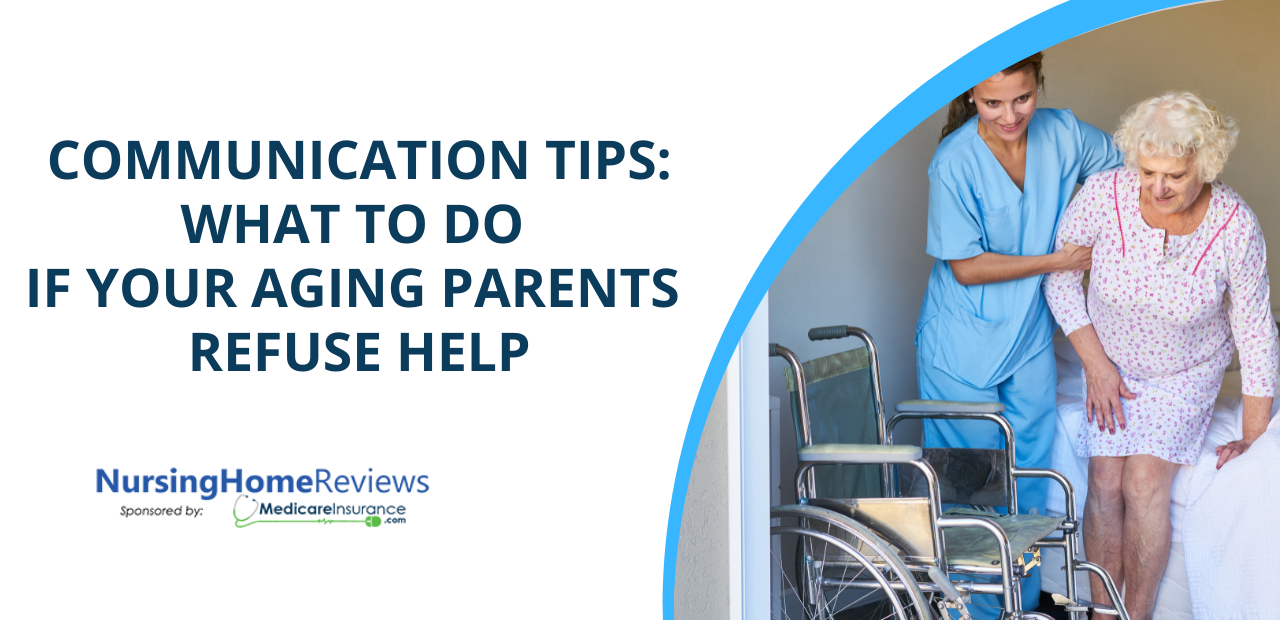
Loss of Independence Can be Tough to Accept
Watching your aging parents struggle to handle everyday tasks for any reason is hard. It’s especially difficult when that loved one is your parent. No one wants to accept that aging parents can often begin to struggle with independent life, however, there comes a time when this is the case. When this happens, we must realize that professional assistance may be necessary.
While you recognize that you need help with aging parents, your parents may refuse to believe there’s anything wrong. It’s never easy to discuss the need for extra help or assisted living with your parents, but it’s a conversation that eventually needs to happen. You must realize, however, that you will likely be met with refusal at first.
So, how do you help your parents realize that they need assistance? Here’s what to do when elderly parents refuse help.
Consider How You May be Approaching the Subject
If you’ve tried to discuss having extra help with aging parents before and it didn’t work, consider your approach. You simply cannot tell your parents that they can’t live on their own anymore and need help. This is an argument in which cognitive and physical conditions are irrelevant. If aging parents hear adult children tell them that they are no longer capable of living on their own without assistance, it can be incredibly hurtful. It may also make your parents question your motives.
Below, you’ll find a few ways to better approach the subject of your aging parents receiving the help that they need.
Frame Your Request Around Your Concerns
Your aging parents value their independence. Even if their condition has deteriorated to a point where they are neglecting their own health and safety, they do not want to be told how to live. They also do not want to feel as if they are a burden on you.
Watching the decline of your adult parents can be incredibly agonizing. Seeing them struggle to move about easily or neglect their own well-being as a result of oncoming cognitive issues. However, approaching your aging parents from the perspective of needing extra assistance because they can no longer take care of themselves will only make them more defensive. Instead, it’s best to let your parents know that you are worried about their situation and wonder if there is a way to help them improve their quality of life.
It’s important to refrain from phrasing your concerns to your parents in a way that makes them sound like their plight is a burden on you. This creates unnecessary stress and guilt for aging parents who are already worried about losing their way of life. Instead, let them know that their current state is a strong point of concern for you, and that you just want to know that they’re safe.
Let Your Parents Vent
Knowing what to do when elderly parents refuse help is important. One of the best tactics you can use to help them is to listen.
When you open up about your concerns regarding the health of your aging parents, you’ll be hitting a sore spot. They may come at you with anger, something very common when caring for someone with dementia or dealing with a dementia patient refusing to go into care. You should know that much of this anger is coming from fear.
Your parents are just as afraid of what’s happening to them as you are. After all, it’s hard not to be able to:
- Travel anywhere independently.
- Move around common spaces as well as you used to.
- Cook or clean for yourself anymore.
If you’re caring for someone with dementia, you especially know that their refusal to accept help is based in fear. We all fear losing control over our own lives and routines.
Needing to transition to assisted living or needing in-home care only proves to us that we have begun to lose that control. Having to take their snark and anger at your concern can hurt, but you must know that the attitude isn’t personal. Your parents are just as angry at themselves, if not more, than they are at you for suggesting assistance.
No Matter the Outcome, Maintain Patience and a Positive Outlook
You may have been attempting to find help with aging parents for years. It doesn’t matter how long it takes for your parents to realize that they need some form of support, you must remain patient and maintain a positive outlook.
Realize that, whether the case is as mild as your aging parents’ current home being too large for them to maintain properly, or as severe as a dementia patient refusing to go into care, it takes time for anyone to realize when change needs to be made. Change, as they say, does not happen overnight.
It’s going to take time for aging parents to come to the realization that a little bit of help can go a long way toward improving their quality of life. You’ll probably have to encounter many rounds of serious conversation before you and your parents mutually agree on a solution that suits them the best. As long as you keep calm and refuse to let conversations devolve into arguments, the solution may come along more quickly than you think.

If Aging Parents are Showing Signs of Cognitive Decline, Work With Them
Aging parents facing cognitive issues, such as dementia or Alzheimer’s, are often the toughest to convince that they need extra care. While it seems that their awareness is leaving them with each passing day, patients with cognitive issues are more aware than you might realize. They are especially aware that their illness is slowly robbing them of their independence, which can lead them to try to hang on to it for as long as they can, even if it hurts them in the long run.
The best thing that you can do with a dementia patient refusing to go into care is to simply meet them in the middle. Work with them to maintain their routines. Make sure they’re eating well. If they have concerns about having caregivers or going to the doctor, address their concerns and offer to stay during the caregiver’s first visits or to accompany them to the doctor. A loved one with dementia’s greatest fear, perhaps, is that you’ll abandon them. Show them that “giving them up” is never going to happen.
Always Keep Your Parents’ Point of View in Mind
When your aging parents hear phrases such as “outside help” or “assisted living,” they may automatically assume the worst. Their first instinct may be to fear that you’re giving up on them and handing them off to be someone else’s burden. This is often the case for those who have been diagnosed with a cognitive illness.
If you can, try to see the idea of transitioning to assisted living from the view of your parents. Visualize your independence being taken away by something that’s beyond your control. How would you feel? That is the perspective you need to consider when raising the subject of finding extra help with aging parents.
In time, with a little patience and a lot of understanding, your parents may start to see the benefit in what you’re discussing. At that point, speak with them to discuss their lifestyle and what works best for them. This will help you and your aging parents make an informed decision when it’s time to help them find a senior community, assisted living facility, or nursing home that will help them maintain their lifestyle and independence as much as possible.
Find a senior community that best meets the needs of your parents.
Start your search today.





